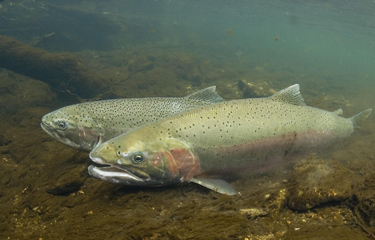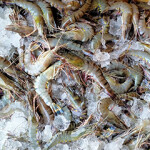Cooke gets draft revised permits for steelhead trout farms from Washington’s Department of Ecology

Cooke Aquaculture Pacific has received drafted revised water quality permits from Washington’s Department of Ecology, another step forward in its effort to shift from farming Atlantic salmon to steelhead trout in its net-pens in Puget Sound.
Blacks Harbour, New Brunswick, Canada-based Cooke has already received a five-year permit from the Washington State Department of Fish and Wildlife (WSDFW) to farm steelhead trout in at one site near Hope Island in Skagit Bay and three net-pen in Rich Passage.
In March 2018, Washington state’s legislature voted to phase out the farming of non-native finfish after some 500,000 Atlantic salmon escaped from a Cooke farm near Cypress Island the previous year. In deciding to farm steelhead, Cooke has found a way to continue farming in the state, as steelhead are native to the Pacific Northwest. In using triploid eggs, the steelhead Cooke is proposing to farm are all sterile females.
The water quality permits are now undergoing public review and comment, with an online hearing scheduled for 14 October and the review period open through 26 October.
“In 2018, the Legislature determined that they preferred the farming of native fish. Since we have always strived to be a good regional partner, steelhead were chosen as the native fish suitable for the Puget Sound and for customer markets,” Cooke Vice President of Public Relations Joel Richardson said.
Cooke has partnered with the Jamestown S’Klallam Tribe in its net-pen farming operations and permits, and Richardson said the partnership, along with the company’s promise of fresh supply of locally farmed seafood, its purchase of new equipment and technology, and its support of local jobs, meant the effort would be a net benefit to the region.
The Department of Ecology has already attached several new conditions to the permits, adding requirements that Cooke conduct increased monitoring and reporting of potential fish escape during stocking and harvesting; conduct monthly reporting for fish feed consumption; maintain all nets in good working order, and study new technologies and propose alternatives that reduce waste from feed. The department has also calrified that any fish reared in Cooke’s net pens are prohibited from release, and has detailed new requirements and details for Cooke to inform state agencies of events that could potentially lead to a fish escape.
In a press release, the department said it will potentially add further modifications to the permits to protect water quality following the public comment period. However, it said it has made the determination that Cooke’s switch from Atlantic salmon to steelhead “would not change potential impacts on water quality.”
“We believe the state’s additional requirements in the draft permits are workable and will allow for sustainable marine aquaculture to continue and the environment to be further protected,” Richardson said.
The department previously amended Cooke’s water quality permits in July 2019 “based on lessons learned from the 2017 net pen collapse at the Cooke Cypress Island site,” it said. Those changes included requiring Cook to increase underwater video monitoring; Conduct regular inspections to assess structural integrity of the net pens, and to submit inspection reports certified by a qualified marine engineer; Improve its maintenance, cleaning, and procedures of care of its net pens. The amendments also required Cooke to coordinate with local tribes and Washington Department of Fish & Wildlife to develop site-specific response plans in case of an escape, and to conduct and participate in preparedness trainings.
Cooke’s existing aquatic leases from the state Department of Natural Resources expire in 2022, and its water quality permits expire in 2024. If Cooke Aquaculture’s aquatic lands leases are not renewed in 2022, its existing water quality permits give the company two years to clean up and remove its net pens.
Cooke’s steelhead-farming plan has been challenged in a lawsuit filed in February 2020 by a group of conservation and environmental groups, claiming the Department of Fish and Wildlife is allowing the use of steelhead feed lots without consideration of what effect they will have on the water quality of Puget Sound and the wild species that live there such as the salmon fishery and orca whales.
Additionally, nonprofit Wild Fish Conservancy has filed a competing application for a new 15-year lease for a site in Port Angeles harbor. If the nonprofit is awarded the permit, it will leave the area in its natural state, according to a Radio Pacific report. Cooke lost its license to farm at the site in 2017, but is applying to use it once again to farm steelhead and black cod. Richardson told Radio Pacific the company has a plan to use new equipment at the site if awarded the permit.
Photo courtesy of NOAA






Share